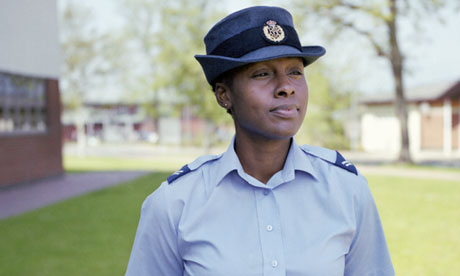A minority report from the British armed services
Page 1 of 1
 A minority report from the British armed services
A minority report from the British armed services
After reports that ethnic minorities continue to be poorly represented in the British military, a young photographer was granted access to several MoD bases to record the views of recruits

What is it like to be one of the approximately 12,000 recruits from ethnic minorities currently serving in the British military? That was the question photographer Kit Oates wanted to address when, earlier this year, he embarked on a project to take portraits of members of the British army, Royal Navy and Royal Air Force from minority backgrounds. "I was interested in recruits who might not have been born here, or whose parents weren't, but who have decided to serve in the armed forces in this country. I thought it was an interesting area in a year when so much has been happening in Great Britain; I wanted to highlight another facet of our multicultural society."
The Ministry of Defence was initially slow to provide access, but Oates believes his request was strengthened by recent reports that ethnic minorities are poorly represented in the British military – making up about 7% of the armed forces, with particularly low numbers in the navy and the RAF. "The British army needs to reflect British society," defence secretary, Philip Hammond, said in June. "This is clearly a challenge now; to recruit from the ethnic minorities within British society in proportions that reflect that society."
Having finally secured access, Oates captured these portraits over four days between April and June, travelling to bases in London, Kent and Portsmouth to photograph people from a wide variety of backgrounds, with roots in India, Malaysia, Kenya and the Caribbean. Diversity may be an issue in the armed services, but Oates's study suggests that ethnic background creates little or no restriction within them; his subjects range from chefs and privates to captains and squadron leaders.
But why aren't more people from ethnic minorities signing up? When I put it to recruiting officer Andy Rahaman that discrimination and racial abuse might still be a concern for potential recruits, he was quick to dismiss the idea. "It's a thing of the past. The military have worked very hard to stamp it out. Thirty years ago it was perhaps more prevalent, but not now."
Oates's subjects have been photographed against the subdued backdrops of English military bases but their faces reveal a worldliness, a sense, even among those in their early 20s, that they have witnessed a great deal. For recent recruits such as army chef Stevan Marston, Afghanistan provided a daunting introduction to foreign service. More seasoned servicemen such as Conrad Walker have been all over the world – Jordan, Kenya, Sierra Leone, Haiti and the Falklands – and not always to wage war.
"The classic image is of white British squaddies running around with guns, but there is more to the army," says Oates. "They do a lot of other things as well." One soldier recalls bringing an immunisation programme to a remote part of Kenya; Walker helped build playgrounds for orphans in Sierra Leone.
For Rahaman, recruiting from ethnic minorities is important beyond reflecting the multicultural makeup of British society: it can positively affect the way the military is perceived, particularly in countries such as Afghanistan. "We've got guys who speak Urdu and Farsi as their first tongue and that's certainly an advantage. You can break down barriers a lot faster than a white guy who only speaks English. It makes life far easier."
Ten portraits have been taken so far and Oates hopes to extend the series for an exhibition. In the meantime, the 25-year-old, who grew up in Shropshire and studied photography at the University of Westminster, is putting the finishing touches to a series about Tanzanian biker gangs.

What is it like to be one of the approximately 12,000 recruits from ethnic minorities currently serving in the British military? That was the question photographer Kit Oates wanted to address when, earlier this year, he embarked on a project to take portraits of members of the British army, Royal Navy and Royal Air Force from minority backgrounds. "I was interested in recruits who might not have been born here, or whose parents weren't, but who have decided to serve in the armed forces in this country. I thought it was an interesting area in a year when so much has been happening in Great Britain; I wanted to highlight another facet of our multicultural society."
The Ministry of Defence was initially slow to provide access, but Oates believes his request was strengthened by recent reports that ethnic minorities are poorly represented in the British military – making up about 7% of the armed forces, with particularly low numbers in the navy and the RAF. "The British army needs to reflect British society," defence secretary, Philip Hammond, said in June. "This is clearly a challenge now; to recruit from the ethnic minorities within British society in proportions that reflect that society."
Having finally secured access, Oates captured these portraits over four days between April and June, travelling to bases in London, Kent and Portsmouth to photograph people from a wide variety of backgrounds, with roots in India, Malaysia, Kenya and the Caribbean. Diversity may be an issue in the armed services, but Oates's study suggests that ethnic background creates little or no restriction within them; his subjects range from chefs and privates to captains and squadron leaders.
But why aren't more people from ethnic minorities signing up? When I put it to recruiting officer Andy Rahaman that discrimination and racial abuse might still be a concern for potential recruits, he was quick to dismiss the idea. "It's a thing of the past. The military have worked very hard to stamp it out. Thirty years ago it was perhaps more prevalent, but not now."
Oates's subjects have been photographed against the subdued backdrops of English military bases but their faces reveal a worldliness, a sense, even among those in their early 20s, that they have witnessed a great deal. For recent recruits such as army chef Stevan Marston, Afghanistan provided a daunting introduction to foreign service. More seasoned servicemen such as Conrad Walker have been all over the world – Jordan, Kenya, Sierra Leone, Haiti and the Falklands – and not always to wage war.
"The classic image is of white British squaddies running around with guns, but there is more to the army," says Oates. "They do a lot of other things as well." One soldier recalls bringing an immunisation programme to a remote part of Kenya; Walker helped build playgrounds for orphans in Sierra Leone.
For Rahaman, recruiting from ethnic minorities is important beyond reflecting the multicultural makeup of British society: it can positively affect the way the military is perceived, particularly in countries such as Afghanistan. "We've got guys who speak Urdu and Farsi as their first tongue and that's certainly an advantage. You can break down barriers a lot faster than a white guy who only speaks English. It makes life far easier."
Ten portraits have been taken so far and Oates hopes to extend the series for an exhibition. In the meantime, the 25-year-old, who grew up in Shropshire and studied photography at the University of Westminster, is putting the finishing touches to a series about Tanzanian biker gangs.
 Similar topics
Similar topics» British BG and British Politician among 21 killed in Kabul
» CTR Services
» Military film services are currently looking for former mil personnel
» Security and Support services Base Coordinator, Libya
» Private Security Services in Europe - CoESS Facts and Figures 2011
» CTR Services
» Military film services are currently looking for former mil personnel
» Security and Support services Base Coordinator, Libya
» Private Security Services in Europe - CoESS Facts and Figures 2011
Page 1 of 1
Permissions in this forum:
You cannot reply to topics in this forum
 Home
Home Register
Register Log in
Log in




» OSINT's books
» Hire Bodyguard in London
» Contact for work
» Updated CV
» Introduction
» Intersec 2017
» HLR/D-HLR Instructor Sweden
» CP SIA, MIRA Quaified